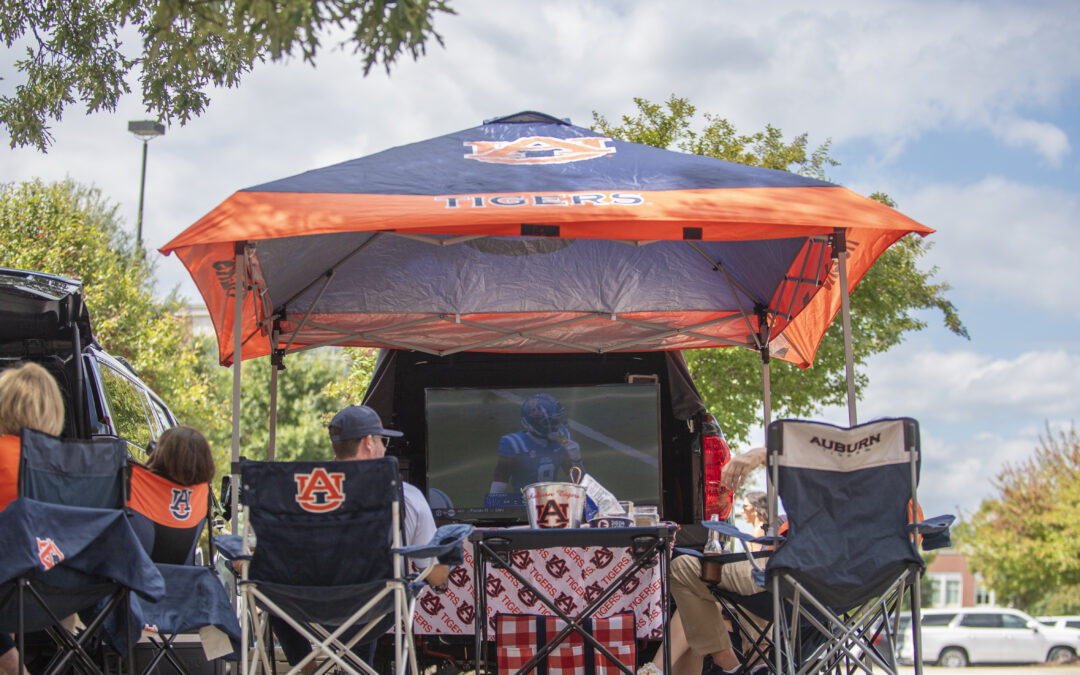BY BRANDON HUGHES
FOR LIVE LEE MAGAZINE
AUBURN — The Iron Bowl is more than just a football game — it’s a cultural event that reverberates not just across the state of Alabama but across the nation. Held annually, usually on the Saturday after Thanksgiving, the game between the Auburn Tigers and the Alabama Crimson Tide has grown to embody everything that Alabamians cherish about college football: passionate traditions and a sense of community that brings people together, much like Thanksgiving, where families unite to celebrate the season.
It has evolved into one of the most intense and consequential rivalries in all of American sports, whether college or professional. In this game, the best season can be ruined with a loss, while the worst season can be rescued with a win. The Iron Bowl, much like Thanksgiving, reminds us that some of the strongest bonds are forged in shared experiences, passed down from one generation to the next. It’s a moment to share food, memories and the deeper sense of belonging and community that both football and the holiday inspire.
A Rivalry Born from the South’s Passion for Football
The Iron Bowl — so named because it was initially played in Birmingham, a city known for its steel industry — originated in 1893 when Auburn and Alabama first faced off on the gridiron. Auburn won the inaugural meeting 32-22 in Birmingham, and over the decades, the stakes have only risen, with each game marking a new chapter in a century-old saga that stretches far beyond the field — it permeates daily life in Alabama.
Families are often split down the middle, friendships tested and workplaces divided. “War Eagle” and “Roll Tide” are greetings that echo year-round through every corner of the state, but the intensity reaches a fever pitch during Iron Bowl week. This rivalry doesn’t just live on the scoreboard — it’s woven into the identity of the people. The game represents more than a chance for victory — it’s about bragging rights, legacy, and, in many ways, identity.
In the Deep South, football is a cultural institution, a way of life. It taps into the heart of what it means to be from Alabama — hard work, loyalty and fierce competition. But it also reflects something bigger — an experience that brings people together, like Thanksgiving.
Thanksgiving is a time for family, but in Alabama, there’s one more thing on the agenda — football. For many, the holiday would not be complete without the Iron Bowl, as the game itself often dictates the rhythm of the weekend.
The Iron Bowl has been played on Thanksgiving Day three times (1894, 1964 and 1992). Still, even when it’s held on the Saturday after, the game serves as a backdrop to family reunions, where fans buzz in anticipation of kickoff and pass down stories of iconic plays and unforgettable moments.
For Auburn, there’s “Punt Bama Punt,” “Bo Over the Top,” “The Camback” and “The Kick Six.”
For Alabama, it’s “The Run in the Mud,” “Wrong Way Bo” and “The Kick.”
Tailgating has become as much a part of the Iron Bowl weekend as the game itself; no longer just a prelude to the game — it’s part of the experience. The tradition of tailgating at the Iron Bowl underscores how football fosters community spirit. Whether it’s an RV setup or a simple tent and folding chairs, tailgating provides a venue for fans to socialize and create memories, often focusing on traditions passed down through generations. Many fans bring their Thanksgiving feast to the tailgate, creating a blend of food, football and tradition that feels distinctly Southern.
Football is part of the nation’s cultural fabric. In Alabama, it is a powerful expression of Southern pride, perseverance and loyalty. For a state with no major professional teams, college football fills the void, and the Iron Bowl is the pinnacle of that devotion. As one of the most storied rivalries in all of sports, it stands as a quintessential example of how football in the South transcends the playing field to become an essential part of local and regional identity.
In many ways, the Iron Bowl amplifies what makes football such a cherished part of American life. It blends the communal aspects of Thanksgiving — family, friends and food — with the fervor of college football.
Rivalries in sports are nothing new; they’ve existed since the earliest teams first faced off, driven by the same fierce competition and desire to dominate that has fueled athletes for generations. But what makes the Iron Bowl truly extraordinary is the way it lingers long after the game is over. For fans, the memories of this game are etched into conversations and social circles, woven into the stories they tell year after year. Whether it’s the thrill of victory or the sting of defeat, the emotions stirred by the Iron Bowl last far beyond a single afternoon.
This game is a reflection of Alabama’s heart and soul. It is no mere sporting event, and calling it a rivalry is too small a term. It transcends sports and taps into the heart of what makes Alabama special: its people, traditions and passion. It’s a celebration of community and unwavering spirit.
In many ways, the Iron Bowl is as American as Thanksgiving itself, embodying the values of competition, community, and tradition that define both the South and the nation.

